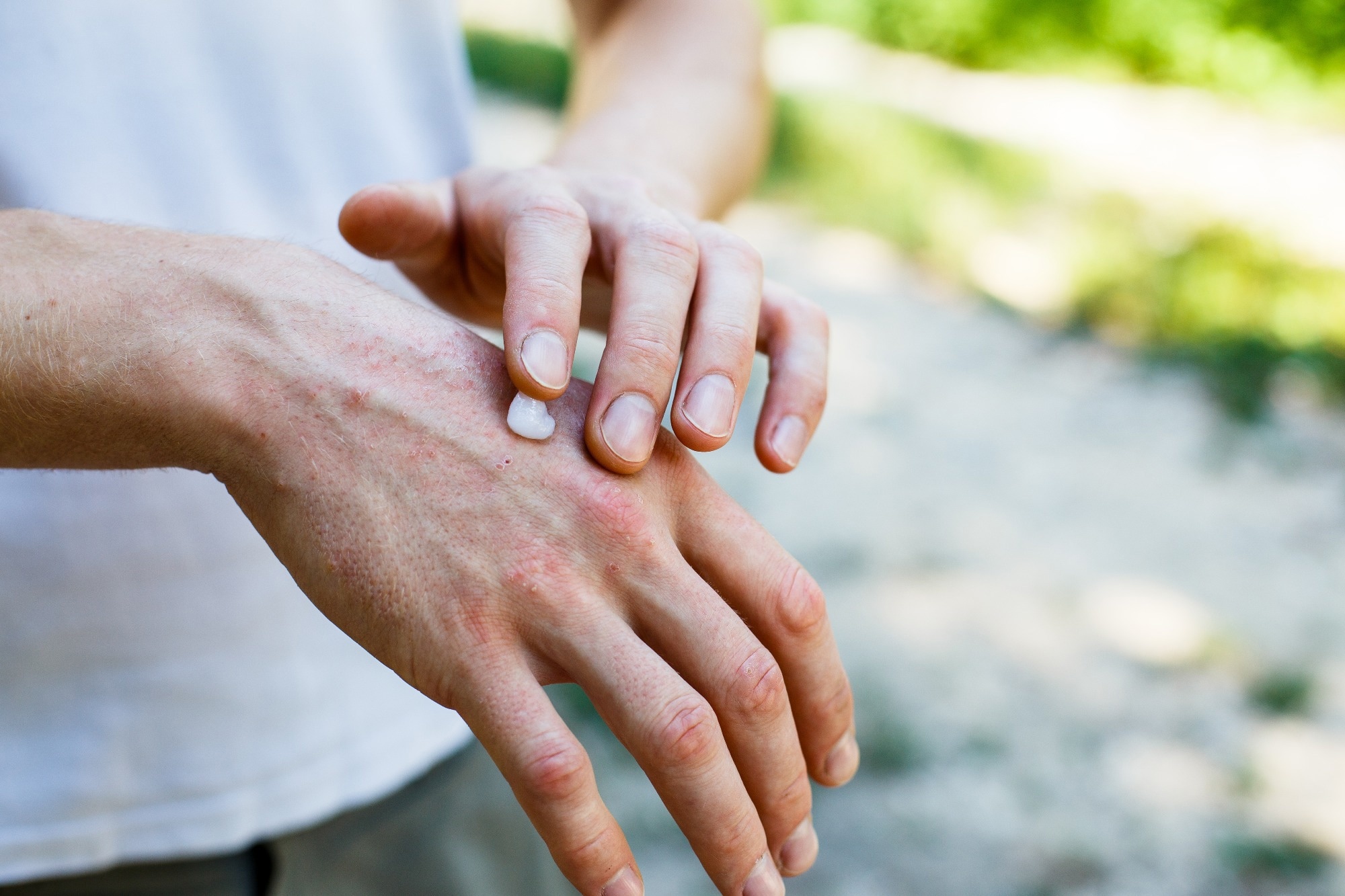Their findings indicate that prolonged exposure to various air pollutants significantly increases the likelihood of developing psoriasis, especially in individuals with a genetic predisposition.

Study: Exposure to Air Pollution, Genetic Susceptibility, and Psoriasis Risk in the UK. Image Credit: Ternavskaia Olga Alibec / Shutterstock
Background
Psoriasis is a common skin disease that causes persistent redness, itching, and discomfort. It is an autoinflammatory disease, which means immune reactions cause it.
Since psoriasis is chronic, it can lead to significant physical and economic burdens and may be associated with other health issues like cardiovascular diseases and arthritis. Although no cure exists, treatments aim to manage symptoms, but they often come with side effects and high costs.
The incidence of psoriasis has been rising, especially in well-resourced countries, making it a growing public health concern. Previous studies have shown a link between short-term air pollution and increased psoriasis-related hospital visits in countries like China, South Korea, and Italy.
However, there is limited evidence on the long-term effects of air pollution and its interaction with genetic factors on the risk of developing psoriasis.
About the study
Researchers investigated the relationship between exposure to various air pollutants over an extended period and psoriasis incidence using data from the UK Biobank, an extensive database with over 500,000 individuals between the ages of 37 and 73, focusing on how genetic susceptibility might influence this risk.
The study included individuals without psoriasis at the start and excluded those with missing data, resulting in 474,055 participants for analysis.
Air pollution data, namely for fine particulate matter with diameters less than 2.5 micrometers (PM2.5), particulate matter with diameters less than 10 micrometers (PM10), nitrogen dioxide (NO2), and nitrogen oxides (NOx), were collected from the UK's Department for Environment, Food and Rural Affairs and matched to participants' residential history.
Genetic risk was assessed using polygenic risk scores (PRS), which combine the effects of many small genetic variations to estimate an individual's likelihood of developing psoriasis. Psoriasis cases that developed during the study were identified through medical records and self-reports.
Researchers used statistical models that allowed for time-varying change to evaluate the relationship between air pollution, genetic risk, and the development of psoriasis. They adjusted for factors like age, sex, ethnicity, lifestyle, and medical history. The models looked at air pollutant levels both as continuous measurements and divided them into four groups based on exposure levels. They examined how genetic risk and air pollution together influenced psoriasis risk.
To ensure the results were reliable, researchers performed additional analyses to check for hidden influencing factors, further focusing on participants who had lived at the same address throughout the study period.
Findings
The participants, who were 57 years old on average, were part of the study for nearly 12 years. During this time, 4,031 new cases of psoriasis were identified. People who developed psoriasis were generally more likely to have higher body mass index (BMI), hypertension, high cholesterol, diabetes, be male, and be smokers while also being less physically active.
The researchers found that higher levels of air pollutants were linked to an increased risk of developing psoriasis. The risk was highest for those living in areas with the highest levels of these pollutants. For example, people in the most polluted areas for PM2.5 had double the risk compared to those in the least polluted areas.
Additionally, genetic factors also played a significant role. Participants with PRS, indicating a greater genetic predisposition, were more likely to develop psoriasis. The combined effect of high genetic risk and high air pollution exposure significantly increased the likelihood of psoriasis, with the highest risks observed in those with both high genetic predisposition and high pollutant exposure.
Conclusions
Researchers found that long-term exposure to air pollution and genetic predisposition substantially increases the risk of developing psoriasis. This association suggests that both environmental factors and genetics play crucial roles in the onset of this skin condition. Previous research mainly focused on short-term effects, while this study provided a comprehensive long-term analysis.
The study's strengths include its large sample size and the use of detailed genetic data, which allow for robust conclusions. However, limitations include potential selection bias, the focus on a predominantly White European population, and the inability to account for indoor or workplace air pollution. The study's observational nature means causal inferences should be made cautiously.
Future research should explore these associations in more diverse populations and include detailed individual exposure assessments. The findings highlight the need for targeted interventions to reduce air pollution exposure, especially for individuals with high genetic risk, to potentially prevent psoriasis.
Journal reference:
- Exposure to Air Pollution, Genetic Susceptibility, and Psoriasis Risk in the UK. Wu, J., Ma, Y., Yang, J., Tian, Y. JAMA Network Open (2024). doi:10.1001/jamanetworkopen.2024.21665, https://jamanetwork.com/journals/jamanetworkopen/fullarticle/2821169